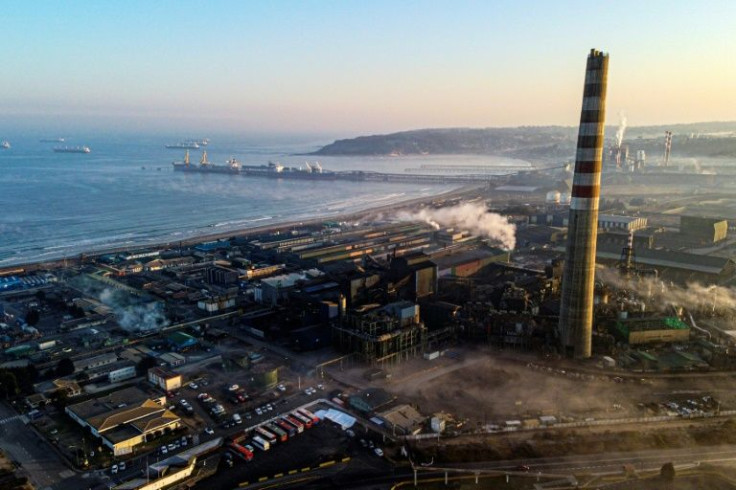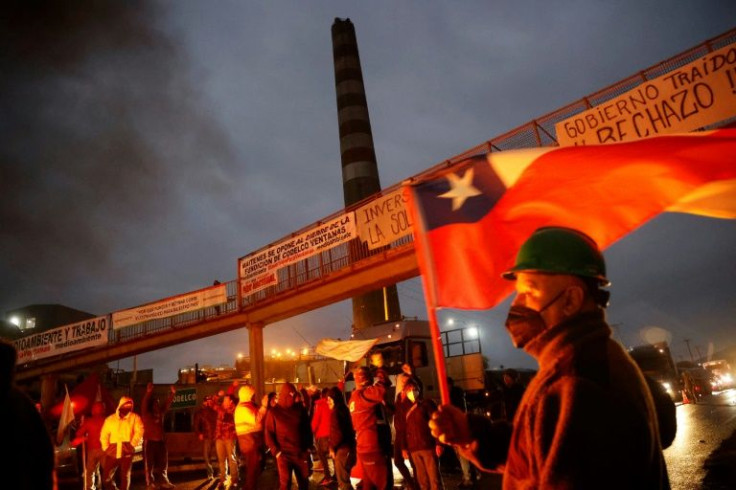Workers Strike At World's Largest Copper Producer, Chile's Codelco
Workers at Chile's state mining company Codelco, the largest producer of copper in the world, went on an "indefinite" strike on Wednesday, unions said, protesting the closure of a foundry in one of the country's most polluted regions.
Codelco announced last week that it would close the Ventanas foundry in the towns of Quintero and Puchuncavi.
The Copper Workers Federation (FTC) released a statement saying there was "full support for this paralyzation (of work) in solidarity with the workers at the Ventanas division" from Codelco's other divisions.

FTC president Amador Pantoja told a local television station the strike will cost Codelco -- which produces around eight percent of the world's copper amounting to 10-15 percent of Chile's GDP -- $20 million a day.
However, Finance Minister Mario Marcel contested that figure.
"For those figures to be correct, all Codelco operations would have to be paralyzed abruptly without this production being recovered in the future and none of those things are happening right now," said Marcel.
"There is no paralyzation of operations, there's a disruption of access by groups of workers."

The FTC represents around 14,000 Codelco workers and another 40,000 external contractors, according to Pantoja.
Unions described the closure of the Ventanas foundry, located around 140 kilometers west of the capital Santiago, as "arbitrary," and are demanding the government invests $54 million to bring the plant up to the highest environmental standards.

The entrance to Ventanas was blocked by burning roadblocks and dozens of workers waving Chilean flags on Wednesday.
"No to closure, yes to investment," read one banner.
Spokeswoman Camila Vallejo said the government "remains open to dialogue" but that it was focused on "a more sustainable model of development."
"Our standards are very low and if we truly want to meet our environmental commitments we have to be guided by" World Health Organization standards, she added.
Codelco's decision comes after an incident on June 9 when 115 people, mostly school children, suffered sulphur dioxide poisoning released by heavy industry, provoking the closure of schools in the area.
It was the second such incident in a matter of just three days.
Sulphur dioxide is a classic air pollutant usually linked to the burning of fossil fuels.
Greenpeace described the area around the Ventanas plant as "Chile's Chernobyl" following a serious incident in 2018 when around 600 people in Quintero and Puchuncavi received medical treatment for symptoms such as vomiting blood, headaches, dizziness, paralysis of their extremities and strange red marks on children's skin.
Last week, President Gabriel Boric hit out at Chile's record on polluting the environment.
"We don't want any more areas of (environmental) sacrifice," he said.
"There are now hundreds of thousands of people who live in our country exposed to severe degradation of the environment that we have provoked or allowed and, as a Chilean, that makes me feel ashamed."
Pollution accumulated in the area of Quintero and Puchuncavi, home to around 50,000 people, after the government decided in 1958 to convert it into an industrial center that now hosts four coal-fired power stations and oil and copper refineries.
© Copyright AFP 2024. All rights reserved.





















